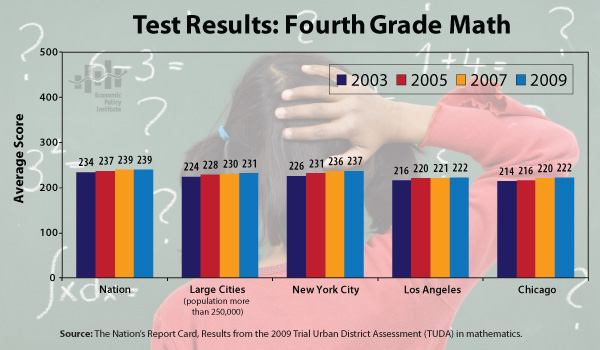By Joydeep Roy
After achieving some gains in student test scores in the early part of the decade, the nation’s schools have seen progress stall since 2007. The figure charts the changes in test scores on the Trial Urban District Assessment (TUDA) for fourth grade math, nationwide and at the country’s three largest urban school districts. Although the exact results vary, there was generally a rise in scores between 2003 and 2007. But those gains either slowed dramatically or completely stalled between 2007 and 2009. The tests, part of the same National Assessment of Educational Progress series administered to all states, are widely considered the best in standardized testing because they are more rigorous than most state-administered tests.

A key concern for educators and policymakers in K-12 education is how to improve student performance in the large urban school districts that have substantial concentrations of minority and disadvantaged children, who often lag behind their more privileged peers. The No Child Left Behind Act of 2001 required all public schools to measure student performance through standardized tests. But in the eight years since then, there has been mounting evidence that students have not been served by a system that has a singular focus on student achievement as measured by standardized test scores in certain grades and subjects. These latest data showing that even test scores – the specific focus of No Child Left Behind – are stagnating seems to offer another indictment of the policy. EPI’s Broader, Bolder Approach to Education campaign outlines a new accountability framework based on a more holistic approach to improving education, including a focus on non-academic factors such as economic security and access to health care and decent, affordable housing, which play a significant role in student performance. Offering students a well-rounded education as well as support outside of the classroom will help them succeed in life, rather than just on standardized tests.
